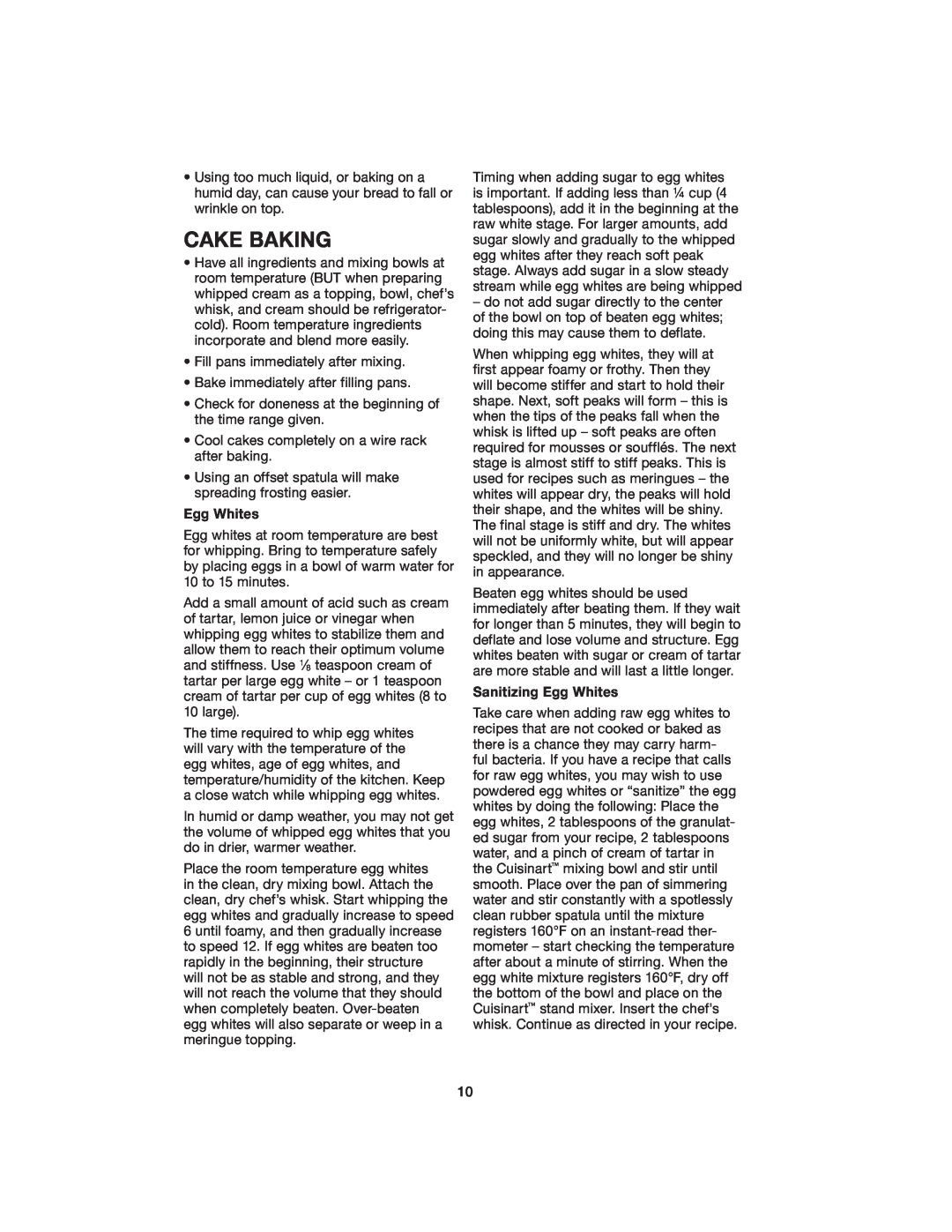•Using too much liquid, or baking on a humid day, can cause your bread to fall or wrinkle on top.
CAKE BAKING
•Have all ingredients and mixing bowls at room temperature (BUT when preparing whipped cream as a topping, bowl, chef’s whisk, and cream should be refrigerator- cold). Room temperature ingredients incorporate and blend more easily.
•Fill pans immediately after mixing.
•Bake immediately after filling pans.
•Check for doneness at the beginning of the time range given.
•Cool cakes completely on a wire rack after baking.
•Using an offset spatula will make spreading frosting easier.
Egg Whites
Egg whites at room temperature are best for whipping. Bring to temperature safely by placing eggs in a bowl of warm water for 10 to 15 minutes.
Add a small amount of acid such as cream of tartar, lemon juice or vinegar when whipping egg whites to stabilize them and allow them to reach their optimum volume and stiffness. Use 1⁄8 teaspoon cream of tartar per large egg white – or 1 teaspoon cream of tartar per cup of egg whites (8 to 10 large).
The time required to whip egg whites will vary with the temperature of the egg whites, age of egg whites, and temperature/humidity of the kitchen. Keep a close watch while whipping egg whites.
In humid or damp weather, you may not get the volume of whipped egg whites that you do in drier, warmer weather.
Place the room temperature egg whites in the clean, dry mixing bowl. Attach the clean, dry chef’s whisk. Start whipping the egg whites and gradually increase to speed 6 until foamy, and then gradually increase to speed 12. If egg whites are beaten too rapidly in the beginning, their structure will not be as stable and strong, and they will not reach the volume that they should when completely beaten.
Timing when adding sugar to egg whites is important. If adding less than ¼ cup (4 tablespoons), add it in the beginning at the raw white stage. For larger amounts, add sugar slowly and gradually to the whipped egg whites after they reach soft peak stage. Always add sugar in a slow steady stream while egg whites are being whipped
–do not add sugar directly to the center of the bowl on top of beaten egg whites; doing this may cause them to deflate.
When whipping egg whites, they will at first appear foamy or frothy. Then they will become stiffer and start to hold their shape. Next, soft peaks will form – this is when the tips of the peaks fall when the whisk is lifted up – soft peaks are often required for mousses or soufflés. The next stage is almost stiff to stiff peaks. This is used for recipes such as meringues – the whites will appear dry, the peaks will hold their shape, and the whites will be shiny. The final stage is stiff and dry. The whites will not be uniformly white, but will appear speckled, and they will no longer be shiny in appearance.
Beaten egg whites should be used immediately after beating them. If they wait for longer than 5 minutes, they will begin to deflate and lose volume and structure. Egg whites beaten with sugar or cream of tartar are more stable and will last a little longer.
Sanitizing Egg Whites
Take care when adding raw egg whites to recipes that are not cooked or baked as there is a chance they may carry harm- ful bacteria. If you have a recipe that calls for raw egg whites, you may wish to use powdered egg whites or “sanitize” the egg whites by doing the following: Place the egg whites, 2 tablespoons of the granulat- ed sugar from your recipe, 2 tablespoons water, and a pinch of cream of tartar in the Cuisinart™ mixing bowl and stir until smooth. Place over the pan of simmering water and stir constantly with a spotlessly clean rubber spatula until the mixture registers 160°F on an
10
